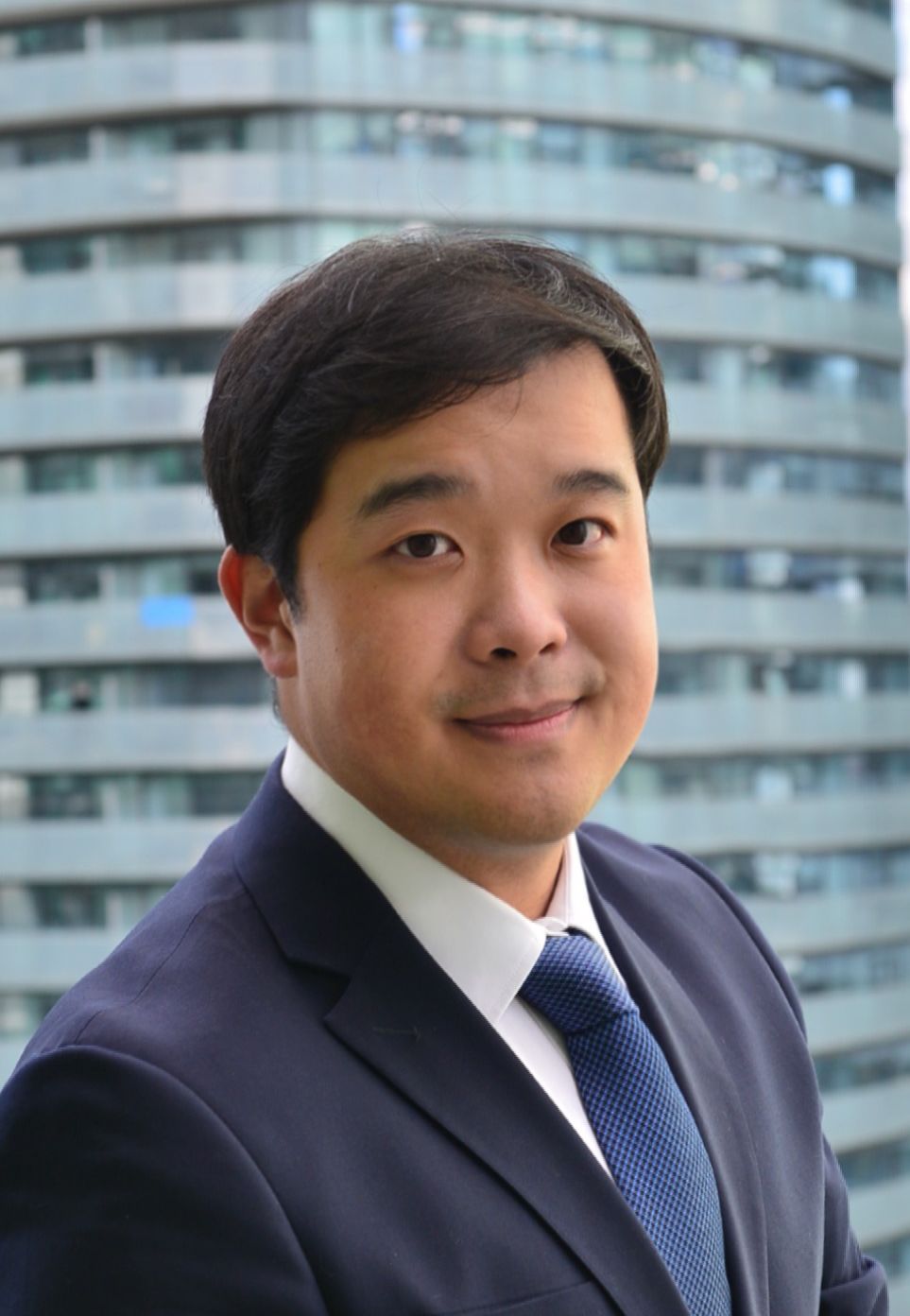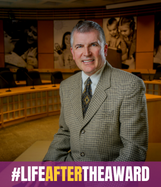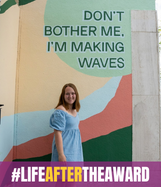By Kimmi Nguyen-Fonseca
Feature image: Courtesy of Ashley Lorette
As far as standing out in a competitive job market is concerned, Ashley Lorette (Gold ’02) is the person to talk to. Her involvement in the Award during her youth provided Ashley with a platform to hone her leadership skills and build connections with her community. After completing her education at Dalhousie University, Ashley now works as a Chartered Professional in Human Resources in Halifax.
In the cozy room where Ashley set up her computer for our interview, the creaking of the door opening can be heard in the background. Ashley’s attention flickers briefly before she composes herself back to the conversation at hand. A small voice speaks softly to her from offscreen. Ashley flashes an apologetic glance and turns away. “I’ll come do snacks, okay? Can you give me two minutes?” She gives a nod of acknowledgement at her kid, then turns back to the screen with a smile on her face.
Multitasking requires a great deal of skill, especially when you’re parenting and working. It requires excellent flexibility, patience, and effective communication.
Ashley attributes the Award to helping her become adept at making the most of her time, even when it means squeezing in a meeting during lunch hour to discuss her Award journey and share her expertise about job search and career development.

Ashley (back, second from left) helps out with a local cadet group activity. Her toddler is with her in the baby carrier on her back. (Courtesy of Ashley Lorette)
Can you describe a key moment that helped you realize the importance of your Award?
After I finished my Gold Award and graduated high school, I entered Dalhousie University. It only took two weeks before I was using the Award in an interview when I applied to be a first-year representative on the Student Union.
I was pleasantly surprised when the interviewers immediately recognized my achievement as a Gold Award Duke of Edinburgh’s Award Holder. One of the interviewers had completed his Silver Award in Saskatchewan. The other interviewer didn’t participate in the Award, but they knew of the Award from their time as a youth in Newfoundland. I remember thinking right away, “Wow, this is great. I’ll have to make sure to note the Award on my CV from now on.”
After graduating from post-secondary, how did you end up working in HR?
It wasn’t my intended career path, but a small piece of one job turned into something much bigger. When my spouse was posted to Newfoundland, I applied to work as a Deputy Municipal Clerk for a municipality there.
The job description I had applied for had this tiny asterisk on it that said, ‘slash, human resources supervisor’. When they were hiring me, I asked them about it and they told me, “Don’t worry about that. It’s really not that big of a portfolio.” It turns out it was a bit overlooked!
So, when I jumped into the role, I very quickly started to focus on human resources. I learned that I really enjoyed that type of work. I enjoyed engaging with perspective employees. I enjoyed creating opportunities, benefits programs for current employees, labour relations and things that were all part of that portfolio. When our family got transferred back to Nova Scotia, I decided to continue with that line of work and started to grow my career in human resources. I spent five years working at Dalhousie University and then went on to be the Director of Human Resources at NSCAD University.
You’re not going to find an HR person who doesn’t champion volunteer work. When you can show you care about your community, it’s a great characteristic for whether you are going to care about your work and your employment.
How do HR professionals view engagement with charitable or community causes?
A lot of times when you look at the types of organizations people choose to volunteer with and the types of people they choose to connect with, you can get a gauge for their personality. You can tell if they have compassion or empathy.
While these often aren’t the key requirements on a job application, many roles that you’re looking at need those characteristics that you’re only going to gain through non-employment related work or experiences like volunteering where you can build on those skills.
It is priceless when it comes to your capabilities as a candidate and how well you score when you are being ranked against other candidates. Volunteering is well known for its importance; using those volunteer experiences to benefit your applications and integration into the workplace community is what makes it valuable.
What advice would you offer about putting volunteer work on your resumé?
Everyone is going have volunteer experience on their application if they’re a strong applicant. If you’re competing against other strong candidates, like Award Holders are, separate yourself from the other candidates. Show how your experiences with the Award and the volunteer work that you’ve done with the Award have really strengthened your character.
Maybe you’re applying for a work opportunity. Maybe you’re making an application for grad school or a professional school. Keep it short on the resumé but use that one bullet point to explain what you learned or gained from your volunteer experience. For example: ‘Volunteering at this society made me feel humble and helped me connect with my community. I learned about the importance of being compassionate while helping others.’ That comes across stronger than just listing where you’ve volunteered.
The act of volunteering isn’t as important as what you’ve gained from the experience. This is what is more relevant when I consider applicants, and I screen resumés all the time and am constantly talking with hiring managers and people within my organization to recruit talent.
What would you tell someone who is looking for a job but might have limited work experience or a gap in their professional experience?
Every volunteer opportunity that you take on is actually a networking opportunity. I’m not suggesting that you go into volunteering and act like you’re at a networking event where you have to be poised at all times. But in the back of your mind, consider that the person that you are sitting next to or the person that you’re working alongside, can provide you with an opportunity in the future.
If you just take every volunteer opportunity as an opportunity to make connections, to build strong relationships, and to show your value, you’re going to be benefiting yourself.

Volunteering can prepare you for entering the job market or making a change in your career. (Tima Miroshnichenko/Pexels)
What advice would you offer to individuals on identifying the right charitable or community causes to get involved with when they are considering a career change?
Look at the organizations that you’re committing to and ensure that their causes are aligned with what you feel your trajectory is. You want to be able show how the things that you’re doing are benefiting you as a professional as you shift or pivot into another role or into another industry.
And if someone wants to pursue a specialized field?
You might want to be more conscious about the types of organizations that you’re volunteering for. If you are trying to gain admission into a certain type of professional school, there will be areas which are more advantageous for you to focus your skills.
Fields like law and medicine are ones where your volunteer work could have a particular impact on whether you’re successful in your application. Medicine, as an example, heavily weights your extracurricular activities as part of your application process.
I also think it’s important to be open to all volunteer opportunities and not to prejudge the opportunity that you’re going into. Try to connect with as many people as possible and to try to assist in as many ways as possible so that you can clearly demonstrate your skills to others. I’ve met people in a volunteer environment who didn’t realize who they were in the company of until afterwards. “That was so-and-so?! I didn’t realize that!”
Take away your preconceived expectation of networking and your expectation of what people should be coming across like or how they should be acting. You don’t know who you’re going to meet.
How can voluntary work help someone in their job search and career development?
If you don’t have the work experience behind a job in a certain field, you have an advantage if you can clearly articulate your volunteer experience in that area. In a job interview, your volunteer experience absolutely holds the same weight when it comes to those type of quantifiable examples. When I’m assessing a candidate, I consider volunteer experience as an equivalent combination of training or work experience.
Even at the stage of career that I’m at now, I can recall the last time that I was interviewed and one of my responses was, “I can’t give you a work-related example with that but let me tell you about this board I’ve volunteered on…” First, it answers the question correctly and accurately. Second, it broadens your scope as a candidate. It shows your prospective employer or interviewer that you’re well-rounded.
The number one example that I would give is budget management. It’s hard for a new graduate or someone who’s coming into the workforce to have budget management experience. However, if you volunteer in a few organizations, that’s one area that you’re probably going to get experience with quite quickly whereas it might take a number of years for you to get that in a work environment.
Are there specific skills or qualities that HR professionals look for that can be gained through volunteering?
As an employer, we can discern that you have empathy, compassion, and dependability if you volunteer at organizations where those skills are evident. Your volunteer experience gives us a concrete example that you possess the skills. If you don’t demonstrate those characteristics, it’s impossible for you to excel in some volunteer situations. Instead of stating that you possess a certain skill in your resumé, use your volunteer experience to illustrate yourself using these skills.
How should someone talk about their volunteer work?
Last year in the provincial effective speaking competition I was a coaching at, one of the questions for the youth was, “What is the importance of volunteer work?” There’s one thing I hear a lot from young people, that when they think about volunteer work, they just automatically associate it with ‘good for my resumé’.
Award holders understand that volunteering is good for your resumé. What you need to know is how to differentiate what is good for your resumé and what you’ve gained from your volunteer experience that makes it good for your resumé. One of the benefits you have as an Award holder is your narrative. You should be able to tell the interviewer how your volunteer experience benefits you and benefits them.

Ashley with board members Melissa MacAdam, Gold ’02 (center) and Marian Jones, Silver ’87 (right) at an Award fundraising dinner. (Courtesy of Ashley Lorette)
You’re an Award alumnus who now volunteers with the Award as a board member. What got you involved with the Award again?
When I started off on my professional path after university, a few of my connections through the Award were Award Leaders. They were always looking for a little extra help. I would take part in an Adventurous Journey as an extra adult. I would provide guidance, support, and feedback to other young cadets.
I participated on the board in Nova Scotia as a youth representative and in 2012, I was approached to step into a director position because of my background in bylaws and in policy development. I thought, “What a great opportunity! The Award meant a lot to me, and I feel I’ve gained a lot from it. Wouldn’t I like to be able to be in the room, shaping other people and the way that the Award progresses?”
Share this...
More Stories Like This





